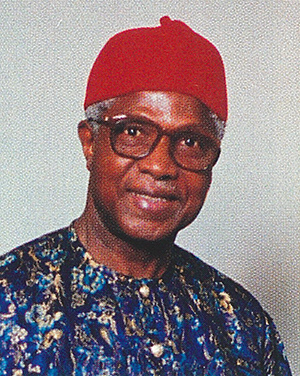Alex Ekwueme, ’55, ’56, ’57, among leading voices in Nigeria

Alex Ekwueme
Phone lines barely work. Water and electricity are chronically in short supply. Corruption and government mismanagement-coupled with a drop in world oil prices-has left Nigeria with a budget deficit in the hundreds of millions of dollars. Ethnic divisions in the country are at a dangerous level. Decades of military rule has left people worn out and frustrated.
But Africa’s most populous nation is trying to change its legacy by making the transition to democracy. One of its guiding forces is Alex Ekwueme, ’55, ’56, ’57, a University of Washington graduate who once served as vice president of his country during a period of civilian rule in the early 1980s and is considered one of Nigeria’s leading statesmen.
This past February, Ekwueme ran for the presidential nomination of the People’s Democratic Party but lost out to his chief rival, Gen. Olusegun Obasanjo, who earned international esteem by becoming Nigeria’s first military leader to give up power voluntarily and run for office.
Becoming a major player in the Nigeria political scene was something Ekwueme aspired to as a youngster. In high school he won a Fulbright scholarship a month before his 20th birthday and enrolled at the UW to study architecture and urban planning.
While a UW student, Ekwueme was a member of the UW delegation to a 1956 Model United Nations Conference held at Oregon State University. He also was president of the Cosmopolitan Club, a group of foreign UW students, and served as the head of another organization of international UW students.
“I enjoyed my UW time very much,” he says. “I was a real curiosity because I was the first student from Nigeria at the UW, but I fit in well, and people were very friendly.”
Ekwueme earned three UW degrees-a bachelor’s degree in sociology and bachelor’s and master’s degrees in urban planning-in addition to a degree in history, philosophy and constitutional law from the University of London. After graduating from the UW in 1957, he built an impressive career in architecture and urban planning, ultimately opening and running the first locally owned architecture firm in Nigeria, where his company designed airports, schools and other buildings.
After a break in the mid-1970s to earn additional degrees in architecture and law in Great Britain, Ekwueme returned to Nigeria in 1979, and was nominated as the vice presidential candidate of the National Party of Nigeria on a ticket with presidential candidate Alhaji Shehu Shagari. They won the election, and were re-elected in 1983.
“Nigeria didn’t have a civilian government so it was a learning process the entire time,” he recalls. “And we were changing from a parliamentary system to a presidential system. But we kept things moving.” However the military reared its head again, toppling the civilian government in a coup d’etat on Dec. 31, 1983. Ekwueme was arrested and detained for six years.
Since his release in 1989, he has worked tirelessly on behalf of peace and democracy in his native land, where he has a reputation as a civilian with an impeccable record. Even the judicial tribunal that probed him after the coup publicly declared, “Dr. Ekwueme left office poorer than he was when he entered it, and to ask more from him was to set a standard which even saints could not meet.” In one act of particular courage in 1998, Ekwueme led a group of 34 eminent Nigerians to forward a petition to Gen. Sani Abacha, the late Nigerian dictator, advising him not to succeed himself. It was without precedent, and at a time Nigeria had been terrorized into silence, and many of its eminent citizens were either jailed, in exile or killed.
Now 66 years old, Ekwueme is a philanthropist as well as a public servant and architect. He established an educational trust fund that sponsors the education of several hundred Nigerian youths in universities at home and abroad. And he aspires to remain involved in Nigerian politics.
“Getting involved in my government was something I always wanted to do,” he says. “I wanted to serve my people and help in the quest for independence. I will keep working for it.”